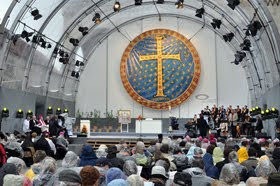
The Second Ecumenical Kirchentag of the German Churches started on May 12th in Munich. Somewhere in the region of 100,000 people have descended on the city, mostly around the Trade Centre for three and a half days of meetings, services, debates, concerts, displays and so on.
At its launch on Wednesday evening, it took over the centre of Munich with music, processions and an endless supply of food stands. Three large open air services began the Kirchentag which then led into the more informal 'evening of encounter'.
I've been attending Kirchentags since 1973 and have always been impressed by the profile that they have in German society. The media covers them extensively and major politicians, including Angela Merkel, take part. The theme of this one is 'That they may have hope'. Usually the Protestants hold theirs one year and the Catholics the next but in 2003 the first joint one was held in Berlin and now this one in Munich. I missed the session with Hans Kung and Jurgen Moltmann today but attended an interesting session on the future of the brain and another on fundamentalism. It is the ability to bring together experts in theology with experts in neuroscience and sociology and so on in the public sphere with an audience of hundreds of people that challenges us in the UK.

